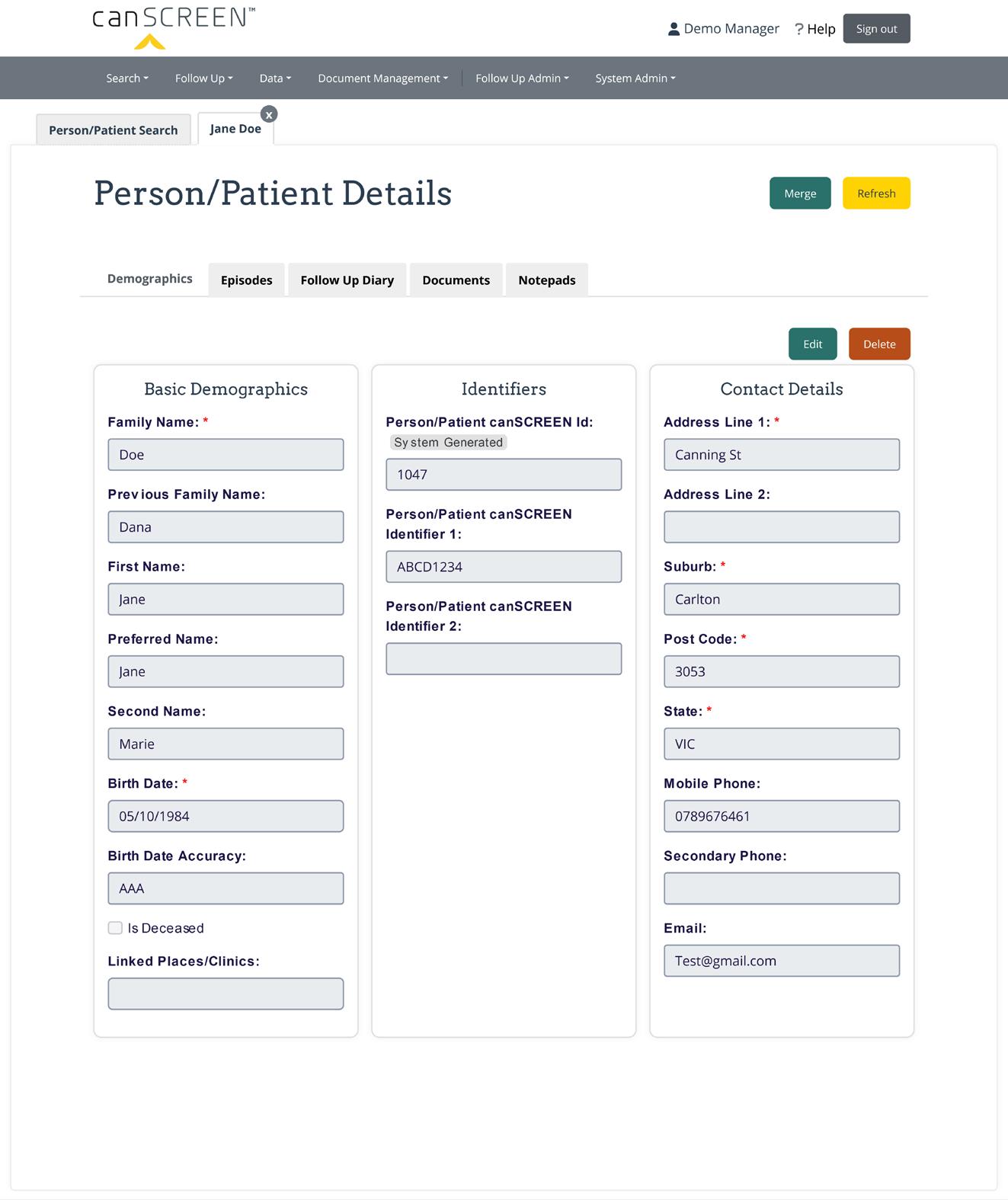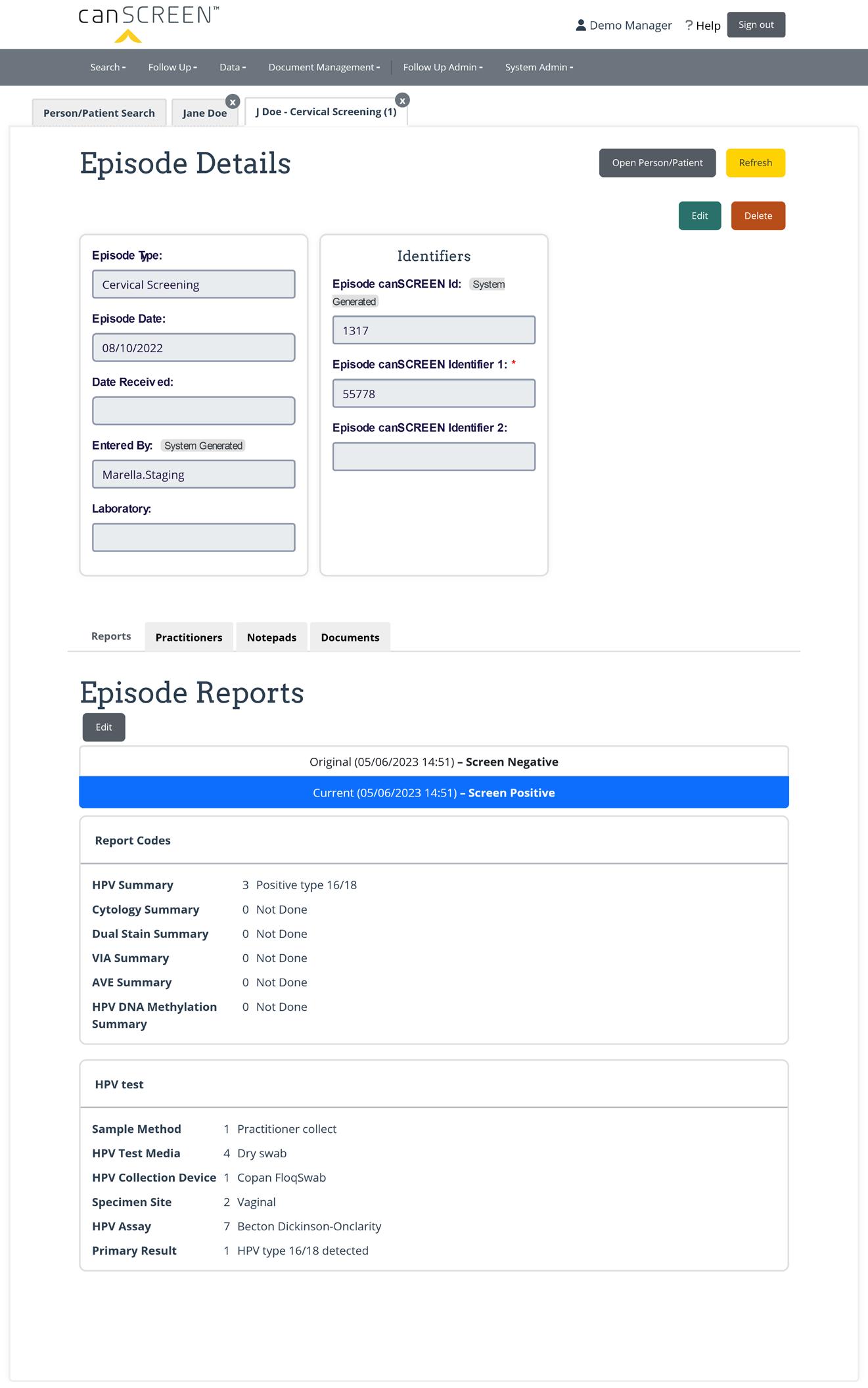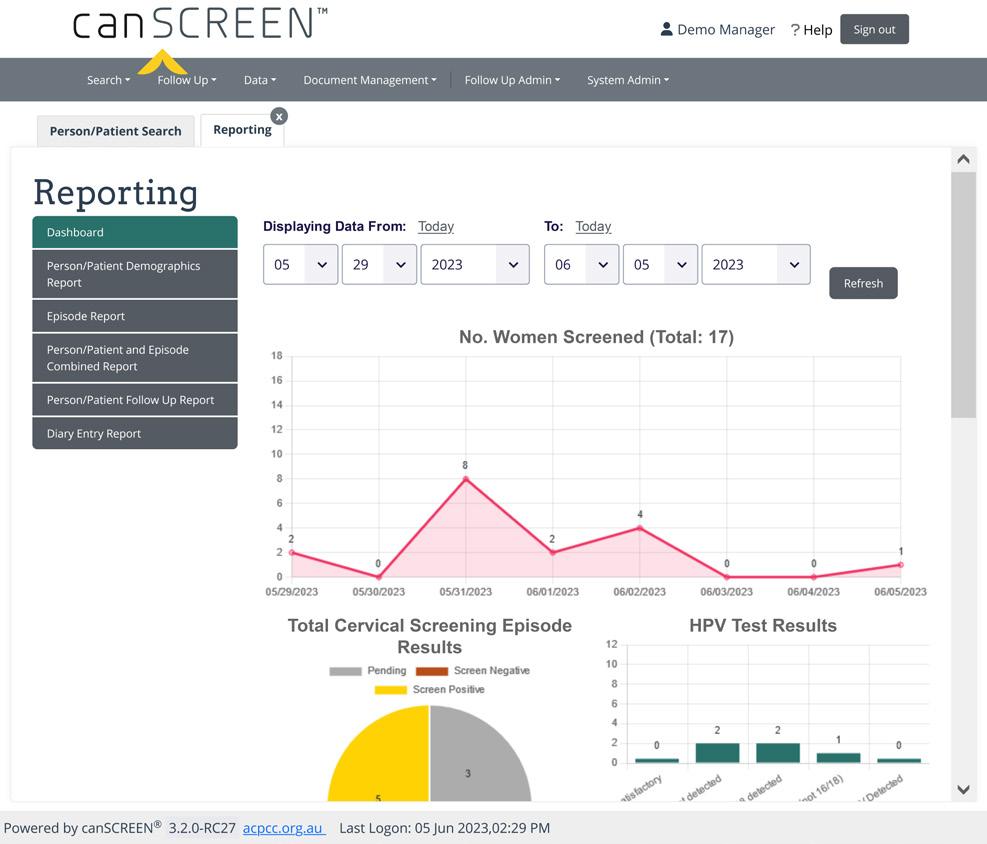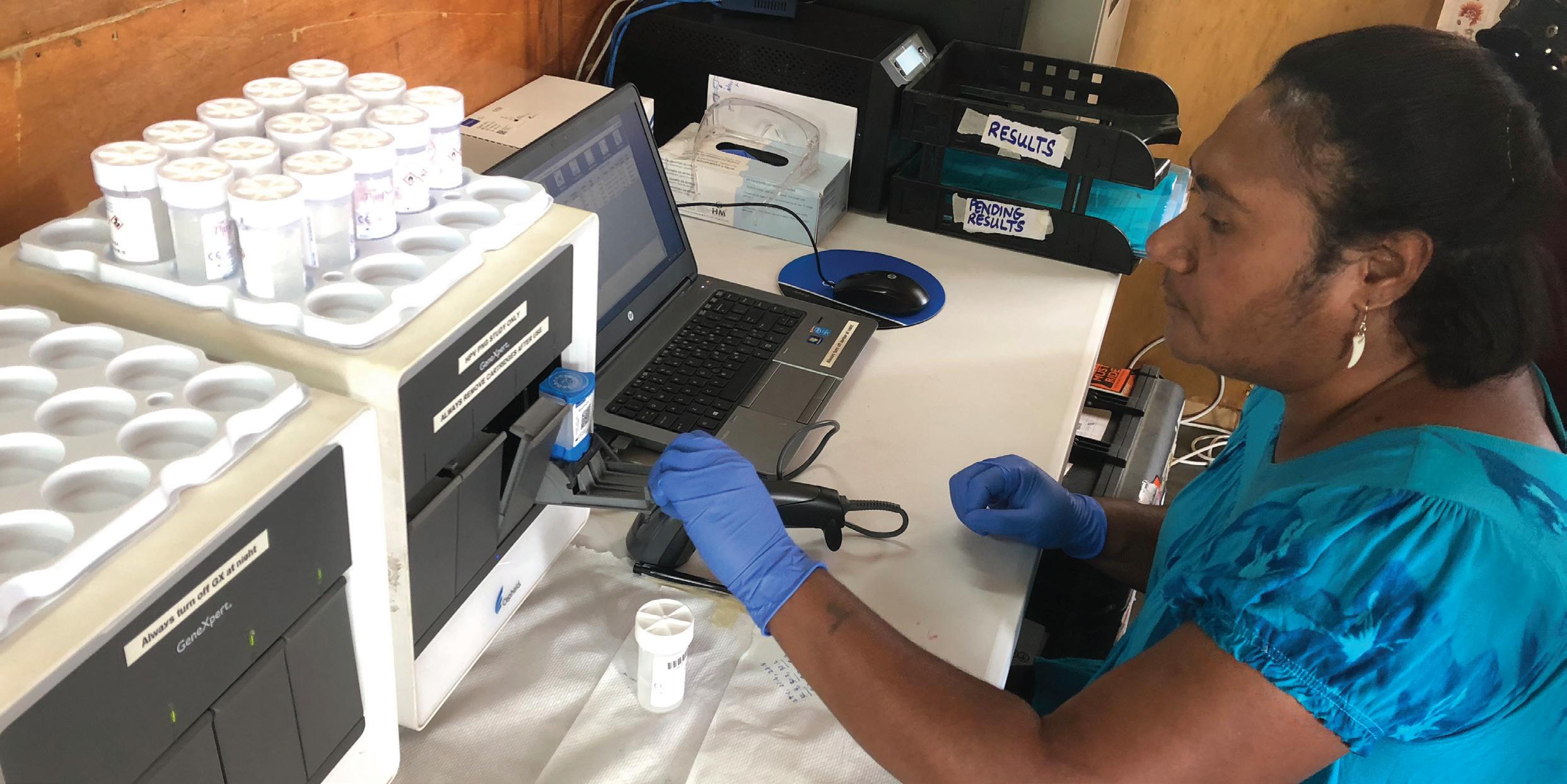a population health digital registry

OUR VISION
To prevent cancer and infectious diseases through excellence in the provision of public health services supporting screening, population-based testing and vaccination.



OUR VISION
To prevent cancer and infectious diseases through excellence in the provision of public health services supporting screening, population-based testing and vaccination.

Australia is a world leader in achieving cervical cancer control in our population, and we are extending our leadership to assist in meeting the WHO strategic targets, to put countries on the path to eliminate cervical cancer.
ACPCC is a not-for-profit organisation established in 1965 to make a positive difference in the lives of Victorians by reducing the impact of cervical cancer. With a proud 57-year history of contributing to Australia’s National Cervical Screening Program through laboratory services, registry programs, research and evidencebased policy recommendations, ACPCC is well positioned to leverage its expertise to support the WHO’s Strategy for all countries to end the suffering caused by cervical cancer.
Our unique suite of services is designed to implement, support, monitor and manage population health programs including cancer screening and vaccination. Our services include (among others):
+ VCS Pathology – a specialist laboratory and medical education service committed to gynaecological health.
+ hosting of the region’s HPV reference laboratory.
+ development and support for the canSCREEN platform and its users in Kenya, PNG, Malaysia, Vanuatu, Yap, New Zealand and Australia.
Our multi-disciplinary team leverages deep expertise along with an ability to support and deliver large scale programs in a costeffective manner.
ACPCC is a trusted advisor to governments locally and globally, participating in numerous committees that are supporting the shift from cytology to HPV screening, and the delivery of HPV vaccination in Australia and around the world.
Vaccination: can assist in managing the provision of the HPV vaccine, if needed.
canSCREEN has already had a significant impact on cervical cancer prevention in countries where it has been deployed, particularly in relation to follow-up rates.
canSCREEN is a valuable example of how technology can be used to improve health outcomes in developing countries. The application uses digital infrastructure to track vaccination and screening activities, and to provide real-time feedback to program managers . This information helps to ensure that the programs reach the most vulnerable people in locations where it is deployed.
Screening: supports in the provision of cervical screening to women aged 25-64 years.

The canSCREEN application provides valuable data on the effectiveness of HPV vaccination and cervical cancer screening in developing countries. This data is designed be used to support ongoing quality improvement in cervical cancer prevention programs.
Treatment: provides a registry for the treatment of women with precancerous changes in the cervix. Treatment can prevent these changes from developing into cancer.
canSCREEN provides a highperforming, integrated, flexible and automated registry platform supporting cancer screening, prevention and vaccination registration at local, regional and national levels. It delivers complete screening records in line with program policies and guidelines and can support multiple programs. The fully-integrated canSCREEN registry can identify eligible persons and send them screening invitations, remind participants when they are due or overdue for a screening test, capture and manage screening tests and related information, monitor a participant’s screening status, support the timely delivery of screening information to healthcare professionals, and provide timely follow-up functions for participants with positive screening tests.
What are the benefits of a cancer screening registry?
+ Reduce the incidence and mortality of preventable cancers by supporting cancer screening initiatives, facilitating follow-up of screen positive people, ultimately saving lives.
+ Underpin reporting on program performance, safety and quality of screening services.
+ Improve the quality and integrity of data on screening program participation to inform public health policy formulation and safety monitoring.
+ Provide data to maximise participation amongst underscreened groups (including culturally and linguistically diverse populations) through targeted initiatives.
+ Inform the effectiveness of government cancer prevention and treatment services.
+ Provide critical data to support research into cancer epidemiology, prevention and treatment.

+ Provide a framework for clinical trials assessing the efficacy of screening tests.
+ Build strong relationships between various stakeholders contributing to cancer screening, driving the success of screening programs.
The canSCREEN registry, combined with ACPCC’s extensive domain knowledge and track record, presents a low-risk solution for governments, healthcare agencies and other stakeholders seeking to implement or expand populationbased cancer screening programs.
Ensuring the highest data security and usability
SECURITY AND AVAILABILITY
+ SAAS – available anywhere, any time on any device
+ Secure on the latest high-performance platforms
+ Multifactor Authentication
+ Azure Cloud performance
+ Mobile offline capability for remote regions
+ Role based access and controls
+ Preconfigured out of the box
+ Evergreen updated through automatic release schedules
REPORTING
+ Integrated dashboards
+ Standard and ad-hoc reporting
+ Health information management and data analytics supporting clinical care, operations, and research
INTEGRATION
+ GeneXpert instruments
+ Deceased data
+ Government information
+ Population listings
+ Health identifiers
+ Other service providers
+ Industry standards –HL7, FHIR, LOINC, SNOMED, ISO etc
+ Clinical contact event management
+ Support for clinical trials
SUPPORTS
+ HPV, Cervical Cytology, VIA, Dual Stain, AVE, Colposcopy test types
+ User centric design to support contact center operators
+ Country and regional support, including management of multiple programs
+ Address and naming localisation
+ Scanning and document management module
+ Support for clinical trials
+ Emails, SMS and Letter automated follow up engine
DATA MANAGEMENT
+ Consumer matching engine
+ Duplicate detection and resolution
+ Address resolution –geocoding
+ Multiple sources/ data feeds
+ Data migration
+ Quality inherent in the design
+ Integrated clinical and operational
+ Quality assurance functionality
+ Detailed auditing
+ Data accuracy indicators
HIGHLY CONFIGURABLE
+ Matching rule configuration
+ Correspondence templates
+ Reminder and clinical care pathway management
+ Health Program level configuration
+ Configurable rules engine
We appreciate the importance of maintaining community confidence in the security of identified sensitive health information. canSCREEN has tight security controls ensuring your instance is as protected as possible from cyber-attacks and bad actors. canSCREEN uses 2 factor Azure authentication to manage access and ACPCC maintain a test and penetration routine to ensure the highest security standards are met.
The canSCREEN application platform, with support from its development partners, was recognised through the Microsoft Australia Partner Award under the category “Technology for Social Impact Award”. From almost 200 nominations across 20 different categories, canSCREEN was awarded for “recognising a partner creating and deploying a cuttingedge technology”.

Capturing Demographic details: canSCREEN can capture a wide range of demographics and is configurable per instance allowing the capture of national identifiers, various address and location information, contact information and social demographics for reporting purposes.

Capturing episode (screening, test or treatment) details:

canSCREEN can integrate with a variety of lab systems. Alternatively, screening and treatment details can be entered manually where integration is not practical (such as in remote locations). ACPCC’s many years of experience in cervical screening practices have allowed us to optimise the fields needed to manage the data in this area.
The fields captured will be updated as clinically validated HPV tests, or other novel screening technologies, come to market.
Follow-up:
canSCREEN can be configured to automatically send SMS messages, WhatsApp message, letters or emails to patients, requesting that they contact their clinic for results or follow-up. We will continue to monitor communication preferences in LMIC to ensure that the most appropriate method of communication is supported by canSCREEN. Communications can be set at periodical intervals and are configurable to each instance.
Additionally, if manual contact is required (for example, phone calls), queues can be set up to remind operators to contact patients directly.

Reporting:
canSCREEN has a live performance dashboard showing how many women have been screened, the percentage of test results, and several other performance indicators. A range of de-identified record-linked data extracts are also available in csv format for deeper analysis and use in BI systems.




canSCREEN is highly configurable and can support almost any screening model including point of care treatment models (such as in Papua New Guinea and Vanuatu).
Patient presents for screening Test is processed on site using instrument such as GeneXpert
Nurse or clinician enters patient data into canSCREEN. canSCREEN then receives test result directly from GeneXpert
It can also support traditional laboratory models (as employed by the ROSE Foundation in Malaysia).

Patient presents for screening
Test sent to lab
Results automatically sent to canSCREEN
Patient given result within hours of the original consultation along with any further advice
Patient can be sent results and follow up info directly
canSCREEN has the ability not just to collect screening information, but also to help with monitoring vaccination programs. canSCREEN has functionality out of the box for recording HPV vaccinations as part of broader campaigns for eliminating cervical cancer.
Providing access to immunisation for vulnerable groups (PAIVnG)
Refugees and asylum seekers arrive in Australia from resource-poor countries that often have suboptimal immunisation coverage. Subsequently, this group is at greater risk of vaccine-preventable diseases and can also be disproportionately impacted by the “No Jab, No Pay” and “No Jab, No Play” policies.
The Victorian Department of Health engaged with ACPCC to facilitate the immunisation management of refugees and asylum seekers as part of the Victorian Government’s Program for Refugee Immunisation Monitoring and Education (PRIME).
Since ACPCC implemented PAIVnG in January 2018, we have continued to support this important project enabling local council project partners to track and refer refugee and asylum seeker clients to complete immunisation.

PAIVnG centralises management of all project data, which allows a single view of participants for councils and DHHS to easily monitor both participant and project progress.
canSCREEN’s PAIVnG instance has now supported in excess of 14000 vulnerable people through their vaccination journey.
The use of canSCREEN to support this program and its ability to provide detailed reports has resulted in the program gaining funding extensions several times over.
canSCREEN:
+ helps to manage referrals for patients.
+ produces reports to prioritise efforts.
+ collects demographic data and details of vaccination events.
+ allows for the uploading and generation of key documents.
+ sends text messages and other forms of correspondence to participants.
The ROSE Foundation, a collaboration between ACPCC and the University of Malaya, integrates the innovative self-sampling model, primary HPV screening and a digital population health registry developed by ACPCC using the canSCREEN platform.
With the three components of self-sampling, HPV testing and canSCREEN, ROSE delivers an integrated screening service that is acceptable to women and ensures that women do not “fall through the cracks”, with healthcare professionals able to track the progress of every woman screened, regardless of where she was screened.
After women carry out the selfsampling HPV test, their samples are sent to the ROSE Laboratory in Malaysia for HPV testing. Results of the HPV test are then communicated to the women via mobile phone allowing them to seamlessly navigate through an otherwise complex and overwhelming healthcare system.
Women in whom HPV is detected are also provided with a phone number for counselling and organising their follow-up care. 89% of participants in whom HPV was detected returned for follow-up care. Current data from the ROSE Foundation indicates that over 23,000 women have been screened under this program, across 160 community locations and clinics throughout Malaysia.

These incredible outcomes were made possible through the hard work of the Program ROSE team in Malaysia, facilitated by canSCREEN. ACPCC provides ongoing support to the ROSE Foundation and has recently assisted with the acquisition of a dedicated a new Roche Cobas 4800 system for HPV testing in the ROSE Laboratory, building in-country capacity for testing.
Over 194
Potential cervical cancer cases are identified & linked for treatment
1 in 4 women have never been screened before or are overdue for cervical screening
women screened
“A seamless screening management system is critical to ensure that women are linked to follow-up care. The patient navigation platform must also be flexible enough to be accessed in the community or hospital so that patient pathways are tailored to communities and not the other way round. CanSCREEN is flexible in that it can tailor to how and where women are screened and followed-up.”
Prof Yin Ling Woo29 Government Hospitals engaged for follow-up
97% would repeat the ROSE test
99% would recommend ROSE test to their friends
Implemented in 160 community locations and clinics across 12 states in Malaysia


Over 90 healthcare professionals engaged
Over 500 Volunteers engaged
The Te Tātai Hauora o Hine Centre for Women’s Health Research and Mahitahi Hauora Primary Health Entity committed to undertake a trial implementing HPV self-testing in Te Tai Tokerau. They chose canSCREEN to support the program and ACPCC delivered it to them in early in 2022. The canSCREEN team also integrated the New Zealand laboratory’s feed into canSCREEN, which automated the population of data into the platform.
The program has already screened 2000 women and it is actively using the SMS and email follow-up functionality in order to best communicate results with patients and to schedule follow-up treatments. The reporting capabilities of canSCREEN give the team great data on which to base planning and reporting on the success of the program.
Using canSCREEN as its registry, the Compass trial seeks to confirm with research evidence the modelled performance of HPV testing compared with cytology testing. This is the first large scale clinical trial internationally to assess primary HPV DNA testing and Liquid Based Cytology screening tests in a population that is highly vaccinated against HPV. A total of 76,000 women participated in the trial, making it the largest randomised controlled trial in Australia.
canSCREEN has also been employed by the National Endometriosis Clinical and Scientific Trials (NECST) Registry to improve endometriosis care. This program, run by the University of New South Wales, utilises canSCREEN to gather information over time in order to understand the causes of endometriosis and to improve care and quality of life for people living with endometriosis (including adenomyosis).
The Elimination of Cervical Cancer in the Western Pacific (ECCWP) project goal is to develop vital digital infrastructure for health systems, and embed WHO’s three-pronged approach for effective vaccinations, screening and treatment to the Western Highlands Province of PNG and nationally in Vanuatu. The ECCWP project has established the necessary digital registry platforms required to guide implementation through the integration of the locally adapted canSCREEN registries in PNG (May 2022) and Vanuatu (September 2022). Since the commencement of the program and the integration of canSCREEN, over 6500 women have been screened, with their results and data entered into the canSCREEN platform.
“canSCREEN holds all our data securely in one place. It is easy to use, monitoring results, generating reports, exporting data for analyses and sending out follow-up correspondence. Also great support from the canSCREEN team!”
Tania Slater
The canSCREEN PNG registry went live on 28th May 2022. The project integrates directly with GeneXpert instruments in the field to get same day results. Both the registry and connectivity solution are now successfully in use in the Mt Hagen WWC. This was the first instance of canSCREEN supporting the “screen and treat” model for HPV screening and the first roll-out of the offline mobile app for the collection of data into canSCREEN.
The PNG team have now screened thousands of patients, with testing continuing to increase as the program expands.
ACPCC have enabled a locally adapted canSCREEN registry in Vanuatu. ACPCC worked with participants from UNSW, VFHA and Vila Central Hospital to facilitate the implementation of the Vanuatu instance. The Vanuatu program has also adopted the “screen and treat” model for HPV treatment, similar to PNG’s program.
The data from both Vanuatu and PNG is informing the strategy for the expanded program and providing valuable insights into the extent of the program required to support the eradication of cervical cancer in the region.


Professor Saville has been the Executive Director of the Australian Centre for the Prevention of Cervical Cancer since 2000. She is internationally regarded for her role in the elimination of cervical cancer in Australia, a key component of which has been the development and deployment of cancer screening registries which ensure that people are not lost to follow-up and that performance of screening programs can be monitored and improved.
Prof Saville is a cytopathologist with special expertise in gynaecological cytology, clinical epidemiology and the translation of research, relevant to cervical screening, into policy. Marion is a leading international expert on cervical screening policy and has served on cervical screening advisory committees in Australia, New Zealand and Ontario. She currently chairs the working group to review Australia’s Guidelines for the management of screen-detected abnormalities in the National Cervical Screening Program and is a member of the living systematic review guidelines development group for WHO. Marion is interested in how culturally safe screening can meet the needs of disadvantaged groups who have poorer cancer outcomes, in Australia and New Zealand and has also focused on research and implementation projects demonstrating that it is possible to deliver high quality, acceptable cervical screening in a range of resource poor settings, collaborating with investigators in Malaysia, leading to the establishment of the ROSE Foundation.
Prof Saville has overseen the delivery of canSCREEN for two states in Australia for up to 23 years and is now overseeing the delivery of canSCREEN in Malaysia, Papua New Guinea, Vanuatu, Kenya and Yap.

canSCREEN has already had a significant impact on cervical cancer prevention in countries where it has been deployed, particularly in relation to follow-up rates.
Please contact us to book a demonstration, and discuss how ACPCC can assist in optimising the outcomes of your:
> cancer screening programs.

> immunisation campaigns.
> population health programs.
Email: canSCREEN@acpcc.org.au
Website: www.acpcc.org.au
Telephone:
+61 3 9250 0300
Street Address: ACPCC
265 Faraday Street Carlton, Victoria AUSTRALIA 3053